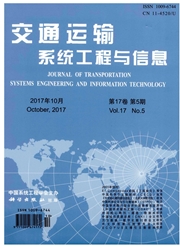

 中文摘要:
中文摘要:
不确定性需求下集装箱海铁联运的箱位分配优化,对联运经营人的经营效率和效益产生极为重要的影响.基于收益管理理论,结合集装箱海铁联运的经营和组织特点,充分考虑合同客户、普通客户和加急客户的不同需求,分两阶段建立了多节点集装箱海铁联运箱位分配优化模型.第一阶段为面向合同客户的协议销售箱位分配模型,第二阶段为面向普通客户和加急客户的自由销售箱位分配模型.针对第一阶段需求的相对确定性特征和第二阶段需求的随机特征,分别运用确定性线性规划(DLP)和随机线性规划(SLP)方法进行模型转化并求解.通过算例验证了上述模型与算法的适用性和有效性.
 英文摘要:
英文摘要:
Slot allocation optimization under uncertain demands has significant impacts on the efficiency and benefit for a muhimodal transport operator (MTO). Based on revenue management theory and features of container sea-rail intermodal transport, this paper establishes a two-stage slot allocation optimization model on the multi-node container sea-rail intermodal line, which takes into account the different demands of contract, general and urgent customers. The first stage is proposed by considering slot allocation for contract customers in contract market, and the second stage is proposed by considering slot allocation for general and urgent customers in free market. Because of the demand relative certainty in the first stage and the demand uncertainty characteristic in the second stage, the method of DLP and SLP are used to transform and solve the models respectively. The results show that the models and algorithms are feasible and effective.
 同期刊论文项目
同期刊论文项目
 同项目期刊论文
同项目期刊论文
 The Improvement of the Reliability of Epidemic Data Dissemination in Coplex Networks with Little Was
The Improvement of the Reliability of Epidemic Data Dissemination in Coplex Networks with Little Was 期刊信息
期刊信息
